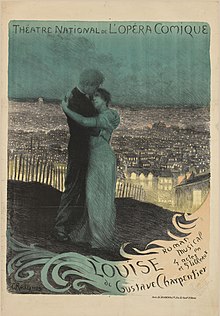| Louise | |
|---|---|
| Opera by Gustave Charpentier | |
 Poster by Rochegrosse for the opera's premiere | |
| Librettist | Gustave Charpentier |
| Language | French |
| Premiere | 2 February 1900 Opéra-Comique, Paris |
Louise is a “musical novel,” or “roman musical,” in four acts and five scenes by Gustave Charpentier. It can be considered an opera. The composer himself penned the French libretto with contributions from Saint-Pol-Roux, a symbolist poet and the inspiration of the surrealists.[1] It is an atmospheric story of working-class life in Paris, with the city itself invoked along the way:[2] young Louise, a seamstress living with her parents, loves Julien, an artist; she desires freedom, associated in her mind with him and the city. (Charpentier would later write a sequel, the opera Julien, describing the artist's aspirations.) Musically the work is considered an example of verismo, and marks the beginning of naturalism in French opera.
- ^ Only Charpentier’s name appears as librettist on all printed sources, but evidence unearthed by Saint-Pol-Roux’s biographer published in 1952 noted that among the poet’s papers were 'about fifty pages' which contained multiple drafts for the libretto. At some point after the spectacularly successful premiere, Saint-Pol-Roux seems to have relinquished his rights to Charpentier for a lump-sum payment. See Huebner S. French Opera at the Fin de Siècle. Oxford University Press, Oxford, 1999.
- ^ Smith, Richard Langham (1992), 'Louise' in The New Grove Dictionary of Opera, ed. Stanley Sadie (London) ISBN 0-333-73432-7